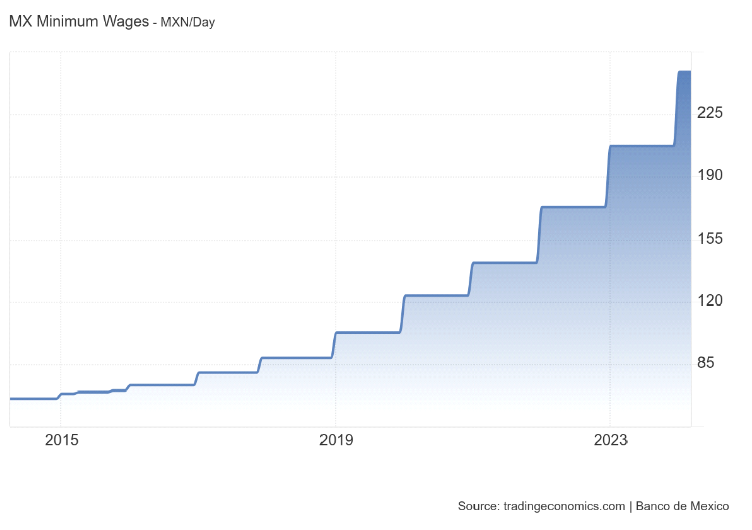How Mexico's new President could make investing in this asset class more attractive
This is the 17th in our series of Trip Insights, where we share our travel experiences. I visited sites across a number of airports and infrastructure assets, meeting with management teams from regulated utilities and transport companies, as well as getting insights from political and economic experts. Company management meetings and site visits are integral to our investment process, and where possible, we look to visit core regions at least annually.
This was a unique trip given the mixed rhetoric we have been hearing on the region’s geopolitical and economic fronts relative to a very positive fundamental outlook for infrastructure operators. As always, it was invaluable to be in the country comparing our regional outlooks and concerns (from an external lens) with the mood on the ground from locals and experts alike. It reinforced our thinking on regions, sectors and companies that looked interesting, and by contrast, where we had growing concerns.
Politics
The domestic and global political landscape is the single biggest headwind for the LatAm region at the moment and is the subject of our next two wires.
From US election policies and China’s potential retaliation to the global demand outlook and domestic policy shifts, the region has a strong mix of positive and negative catalysts. It’s incredibly relevant to the infrastructure outlook, and we spent a great deal of time exploring the theme over the two-week trip with those who have greater insight.
At the ground level, the mood across the region seemed content, if not relatively buoyant. This is supported by the reigning populist governments who have significantly improved lower-class living standards, supporting domestic consumption. Domestic politics were not top of mind or raised in conversation, but the US election was a near-term concern and conversation point.
Mexico
It's been a big year for Mexico and one that has created near-term political uncertainty. While the June election win for the ruling Morena party candidate, Claudia Sheinbaum, was widely expected and priced into markets, what was a surprise was the degree of popularity and the overall majority that she achieved. Domestically, many are still digesting the fact that she won by a landslide margin of over 33 points, receiving the highest number of votes ever recorded for a candidate in Mexican history, and importantly, more support than her ‘mentor’, departing president Andres Manual Lopex Obrador (AMLO).
Structurally, it could be argued that the Mexican election system is flawed – the single (six-year) presidency certainly does not allow time to ‘settle into the role’ nor create any public oversight on electees looking for a second term. The one-and-done model can promote speed of execution, and for those with an ego looking to leave a populist ‘legacy’ ignore the longer-term fundamental checks and balances of economic policy. This is clear as AMLO departs:
- His 2018 cancellation of the partially constructed Mexico City Airport as per his election promises – this was a US$13 billion project with a sunk cost for the government of circa $7-8 billion. Further, it has cost the population an unquantified sum in the lack of ongoing airport connectivity and efficiency.
- Meteoric increase in the minimum wage with annual increases of between 15-22% under the AMLO regime including +20% in 2024.

National ownership of generation capacity, with AMLO advocating an energy sovereignty policy resulting in much-needed foreign investment leaving the country. As a result, energy security could delay Mexico’s near-shoring potential.
Importantly, Mexico has survived AMLO’s mandate relatively unscathed for the moment, and on October 1, he will exit the arena, never to return. However, the incoming Sheinbaum does not have as easy a path with the government budget in significantly worse shape as a result of AMLO.
Over the medium term, the consensus view is Sheinbaum will prove to be more pragmatic than her mentor, having her own mind, policies and priorities to advance Mexico, particularly within the energy domain. Positively, given her popularity exceeded that of AMLO, there is no suggestion anymore that she is just his ‘puppet’ dancing to his tune.
However, in the short term, concerns are definitely elevated as the Morena Party has won a ‘super majority’, effectively removing the checks and balances of a less dominant government. Interestingly, while we were in Mexico, there was some argument that they would not achieve this majority. However, on August 23, the INE (National Electoral Institute) confirmed Morena’s position. This is the single biggest near-term headwind for Mexico and the key concern of domestic specialists as this opens the door for the easier passing of controversial policies. As discussed, whilst widely believed Sheinbaum will be pragmatic and work within the need to attract international capital, in the short term, unpopular policies (at the international level) could be passed, with none more controversial than electoral reform.
Electoral reform
During his term, AMLO looked to pass electoral reforms many times and was successfully blocked at each attempt. The latest in February this year looked to restructure the INE by reducing the number of councillors and requiring that electoral judges be elected by popular vote. It further supported the elimination of all seats allocated by proportional representation, reducing the Chamber of Deputies by 40% from 500 to 300 and the Senate by half from 128 to 64 seats. The biggest concern is the election of judges, amid fears that this will corrupt the system.
AMLO would have loved to see this reform passed ahead of his departure. However, even with delays, Sheinbaum has stated that she will push forward with the reform and has additionally proposed a constitutional amendment to prevent re-election for any popularly elected position.
While we were in Mexico, the base case was that this reform would be passed and that this was largely priced into markets, with Mexico trading at approximately 11x forward earnings, which is more than a 25% discount to its historical average of 15x, or two standard deviations below. This level has only been previously reached during the pandemic, during the GFC, and toward the end of 2023, following the interference in the airport concessions.
The ongoing concern is how this reform translates into judicial resolve, with expectations that this will create increased market volatility until it has been tested over the coming six to 12 months.
Passing the reform itself is no longer the issue – rather it’s waiting on the first test of the new system in the courts, with the timing on this very unclear. It could prove to be a storm in a teacup, or it could introduce electoral corruption and derail foreign capital flow to the country.
Recent timeline to the bill:
August 16 - the judicial reform bill was sent to the constitutional commissions in Congress to start the legislative discussion.
August 21 – the judicial powers instigated a strike with a participation rate of ~85%.
August 26 – the commissions approved the amended constitutional bill.
First week of September – the bill was debated by the plenary of the congress, noting that there have been 100 amendments to the original judicial reform presented by AMLO in February 2024, but the core mandate to elect judges by popular vote remained intact.
The transit of this reform is a clear overhang for the country over the near to medium term and must be factored into our country risk assessment. Importantly, while domestically this was also a disappointment, the rhetoric was not all doom and gloom, with expectations that processes and the need for foreign capital should provide fundamental system oversight.
In particular, the market reaction to interference in the airport sector last year gave the government and lawmakers some insight into what could happen if they did not uphold contracts and laws (the whole market was punished). At the same time, there was recognition that markets would be volatile in the near term.
Pros to Sheinbaum
Having focussed on the clear negatives of the current political dynamic, it’s only fair to highlight a couple of potential wins for Mexico that could be supported by the current regime:
Near-shoring – a huge theme globally and Mexico is a clear beneficiary of the opportunity for near-shoring. This is receiving significant government support as they, and their neighbours, look to reduce exposure to China. The biggest hurdle to the return of commercial/industrial/manufacturing hubs is the security of energy supply. Importantly, both the existing and the new government have recognised this and are working to reinforce energy positions and storage to support onshoring efforts. As this opportunity continues to grow, and the data centre opportunity also enters the mix, the government must address this or derail Mexico’s growth. This is something Sheinbaum is very cognisant of.
Energy investment – as mentioned above AMLO had a strict energy sovereignty policy with an associated departure of significant foreign sector investment into the energy sector. However, Mexico needs foreign capital if they are in any way going to achieve energy security and support the near-shoring opportunity. Importantly, Sheinbaum has very clear and practical ideas on the need for a diversity of sources and increased investment in the sector. As such, it’s widely anticipated that policy will again shift to support and attract foreign sector capital.
Social programs – the big populous win for AMLO has been an exponential growth in the minimum wage and social programs during his tenure at +20% p.a. While Sheinbaum is supportive of ongoing social mandates, she has been more targeted in new programs and more conservative in increases to existing programs at ‘above inflation’, which shows some economic discipline within government budgets that cannot continue to support AMLO levels of increase. Improved living conditions for the lower class are also supportive of domestic consumption as well as a reduction in poverty-led crime and shadow economies.
Security – improved security and reduced crime and violence were top of mind for voters, and important at an international level for investors and visitors alike. AMLO’s “hugs, not bullets” slogan has provided little comfort. By contrast, when head of government in Mexico City, Sheinbaum successfully introduced policies to bring homicides to a level not seen since 1989. She has committed to replicating this success at a national level. While this is not simple, it does not rely on social justice and should see more success and greater confidence that the government is working to address violence at all levels, attracting tourism and international businesses to the country.
As infrastructure investors, these are themes we can and would like to participate in, as would many foreign investors. Notwithstanding near-term concerns, we continue to see the risk/reward trade-off as attractive for key Mexican airport operators.
In our next edition of this series, we'll look at the political landscapes in Brazil and Argentina. We'll also discuss how the US election could impact the LatAm investing environment.


2 funds mentioned

